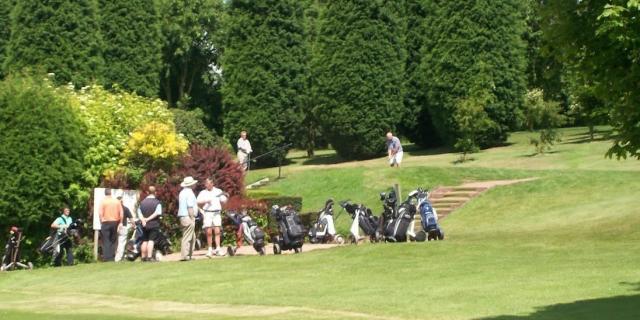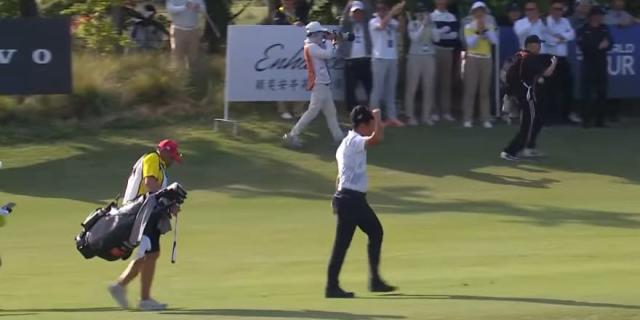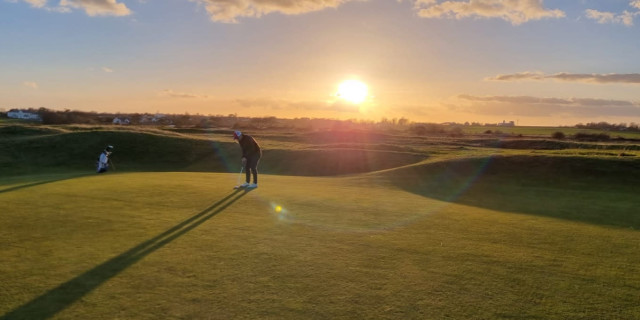
What Can Golf Clubs Do To Speed Up Play
In the first of a series of articles focused on addressing how slow play on the golf course can be solved, we take a look at some of the ideas you offered into what golf clubs can do.
Slow play is not all about blaming individual golfers, our recent survey on the subject was a revelation, with over 1,200 of you responding and coming up with a long list of solutions. However, 60% of those comments related to etiquette, awareness, knowledge, and ready golf.
Alongside those comments on what golfers can do, more to follow on this, this article looks at what you think golf clubs should be doing, and you are to be congratulated for coming up with so many common-sense answers to an issue that is one of the main talking points in our game.
Featured Content

So what can golf clubs do to speed up play? Here are some of your thoughts...
"£10 refundable deposit paid at the pro shop if you complete your round in less than four hours or a golf 'driving licence' scheme to educate new players about etiquette, where to leave your bag, basic rules, etc, before being allowed to play on an 18-hole golf course.”
On paper, this is a winner BUT what happens if your game gets stuck behind a slow fourball? It would be totally unfair to penalise everybody because of one or two groups who hold up everybody else.
Course Conditions
Many of you believe that clubs make their courses too difficult.
"Make sure the courses keep the rough - even the woods - mowed, so people aren't constantly looking for balls, especially in the rough (we're not playing a US Open!)"
"Adjusting the length of grass around the edge of the fairways and waste areas to help with the speed of locating your ball when it's off the fairway.”
"At my home course the depth of rough in the summer, it's too wide and too deep for the average golfer, if I'm playing in a four-ball it only takes one player every other hole to slow the round by 30 minutes."
"At my home course the rough could be shorter, also fewer medals, every medal comp slows pace of play, maybe use different scoring so that the individuals are less concerned with finding the ball in the long stuff."
"At our course the rough has been allowed to grow to very penal levels. This means that a large number of provisional balls are played and time taken up looking for balls."
"Cut back rough - handicap golfers inevitably hit the ball in the rough and when it's knee high they always take the full three minutes to look for the ball but very rarely find it."
"Different tees for high handicappers. Golf course setup, make the rough less penal.”
"Greenkeepers need to cut the rough, which would speed up play as you aren't spending too much time searching for balls."
"In relation to my home course, I'd cut back the rough to make the playing area slightly wider and thin it out so that balls that did go in are more easily findable. As a high(ish) handicapper I realise single figure golfers probably want the challenge, but looking for lost balls (even sticking to the three minute rule) seems to be an all-too-common experience for a lot of groups.”
Having knee-high rough on a championship course is one thing, having thick rough on a members’ course is something entirely different. Yes, we all want a challenge but golf is meant to be enjoyable so it makes perfect sense to keep the rough short if you want to keep play moving along at a decent pace.
Course Marshalls
"Marshalls travelling in reverse order from the 18th through the course to ensure players are playing at a reasonable time and managing open holes by directing players that are slower, to allow groups waiting behind them to play through."
"Employ a course marshall to ride around the course and make sure players are keeping up with the group ahead of them.”
"Better marshalling. Better signage informing players the time they should be at certain holes. Pro shop informs players of their duty regarding slow play before tee off."
"Better use of course marshalls to ensure all players are aware of keeping up with the group in front and knowing it is expected to let groups through if they have dropped behind."
This all comes down to cost. In an ideal world I believe we would all want to see marshalls patrolling the course and cajoling players, perhaps even with the power to impose some kind of penalty upon groups who take no notice of his advice.
Tee Times & Group Sizes
Unsurprisingly, a fair number of you have addressed the issue of intervals between tee times.
"Although it would lose clubs some money, space out some tee times. All I see is groups teeing off instantly after each other, some even before their tee times and then wondering why they are waiting at a tee box for the next hole."
"Make tee time spaces longer, 7-10 minute intervals is a joke.”
"Don't overbook courses and give more time between groups. Some courses book a group every eight minutes. This means that if one player in the group in front of you loses a ball, they have three minutes to look for it. That then slows down every following group.”
Increasing gaps between players is all well and good in theory but to enforce it you need a starter’s hut beside the first tee - and that means employing a starter. It is human nature that if you bowl up to the first tee and it is clear you are going to play.
"Advice should be given to society organisers not to put all of the high handicappers in the back group or groups. I've been there, in the back group on many occasions, and it doesn't work.”
On the face of it this is another winner but spare a thought for anybody playing the course behind those high handicappers, no matter where they are playing within their society group. It is up to the better players to ensure that the high handicappers pick up their ball when they cannot possibly score on a hole.
"Make two balls join up to make a four. Make club competitions play ready golf. No back tee golf at weekends.”
Many courses already do this and others insist that if there are four of you then you have to play foursomes - and that is something that is not universally popular, to put it mildly!
Enforcing Rules & Considerate Golf
"Clubs reminding people forcefully of the laws of the game - play up to the people in front, don't mark your card on the green, leave your bag(s) in the most expedient place to clear the green."
"Clubs should set and communicate clear rules for lost-ball-finding time-limits. At busy times, marshalls should patrol in buggies and ensure that slow groups hurry up.”
"Educate golfers on etiquette. Waving groups through, not looking for balls for five minutes and letting faster players through."
If we could find a way to enforce the three-minute rule for lost golf balls then we would make huge inroads into the entire slow play issue at a stroke.
"Constantly remind, and enforce if necessary, the etiquette to wave through groups of any size that are faster. Remind people about things like ready golf, not leaving bags in front of green, etc."
"Constantly reminding members and visitors of the need to consider the players behind them and keep up a good pace.”
"Communication to players about pace of play and continuous offenders informed by committee of the errors of their way. If no result then possible ban of offenders.”
Banning people who have paid annual subscriptions seems a bit extreme. While I hate slow play, I have to say that most of those who are “guilty” do not do it deliberately.
New Rules & Technology
Many of you think that it is simply a matter of clubs enforcing the rules and making a few tweaks.
"Change the accepted etiquette so that faster golfers can request to play through rather than having to wait to be invited.”
"Enforce mandatory wave through for players following groups who have lost at least a hole on the group ahead."
Fine in theory, but what happens if those people refuse to give way?
"A traffic light system. At every tee the golfers are rated green, amber or red based on their time. Red means the group has to leave the course. Could be done with a swipe card system."
Funnily enough, my own club is looking at a yellow and red-card penalty system. If an individual is identified as a slow player - and let’s face it, we ALL know who the culprits are at our clubs - he initially gets a yellow card. If he receives a second yellow he is given a red card which means that he is put at the end of the field for the next competition.
"All clubs should advertise that 'Ready Golf' is in play at all times and explain what that means.”
Why do so many club golfers find it so hard to grasp the concept of ready golf? I just don’t get it.
"Put a GPS on each group and send them messages to speed up if they are falling behind and ultimately apply sanctions if they don’t, such as suspending their membership for a period of time or ban them if visitors.”
If most golf clubs are unable to provide us with decent websites (and they don’t), I do wonder what the chances of persuading them to invest in this proposal would be. There will be some who would support this but there will be others who will say that it smacks of Big Brother.
One thing is beyond dispute - there are plenty of imaginative solutions here and it is clear that most of us want action. So, golf clubs of Great Britain, it is over to you...
Related Articles
What Causes Slow Play on The Golf Course
Tags: Survey slow play Pace of Play industry insider golf data daily picks









